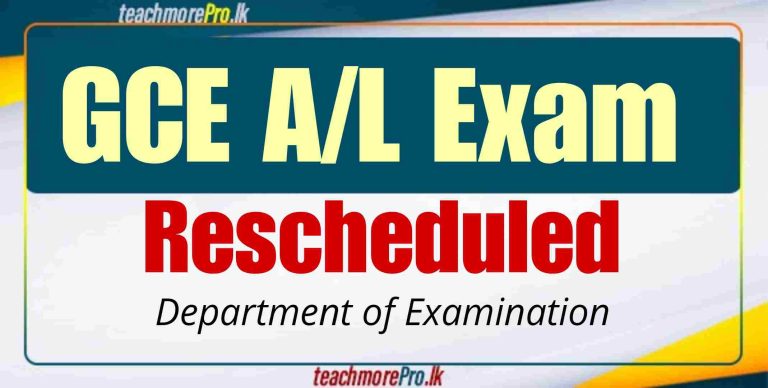The GCE Advanced Level (A/L) Examination in Sri Lanka is one of the most significant academic milestones for students, marking the gateway to higher education and career opportunities. Conducted by the Department of Examinations, the A/L exam is a rigorous assessment designed to gauge students’ academic knowledge, critical thinking, and ability to excel in specialized fields. Passing the A/L examination is essential for university admission in Sri Lanka, and it shapes students’ futures by determining their eligibility for higher education in competitive fields such as medicine, engineering, management, and the sciences. This blog post provides an in-depth look at the GCE A/L exam, its structure, subjects offered, and its role in shaping students’ academic and professional paths in Sri Lanka.
Overview of the GCE A/L Examination in Sri Lanka
The General Certificate of Education (Advanced Level) or GCE A/L examination is an annual national exam conducted by the Department of Examinations, Sri Lanka. It is held each August and typically taken by students who have completed their GCE Ordinary Level (O/L) examinations and spent two years in A/L classes, specializing in their chosen streams. The exam serves as the final step in secondary education and the main qualification for university entry.
The exam is designed to evaluate the students’ knowledge in specific subject areas related to their preferred academic or professional fields. Success in the A/L examination not only paves the way for higher education but also opens up numerous job opportunities in both the public and private sectors for those who do not pursue further studies immediately.
Streams and Subject Choices in the A/L Examination
In Sri Lanka, the A/L examination offers students the flexibility to choose from various streams based on their career aspirations and areas of interest. The main streams available are:
- Science Stream: This stream includes subjects such as Physics, Chemistry, Biology, and Combined Mathematics. Students who excel in this stream often pursue careers in medicine, engineering, or scientific research.
- Commerce Stream: Focusing on subjects like Accounting, Business Studies, and Economics, this stream is ideal for students who aspire to careers in finance, management, business administration, or entrepreneurship.
- Arts Stream: Offering a wide range of subjects including Sinhala, History, Geography, Political Science, and Psychology, the Arts stream is suitable for students interested in humanities, social sciences, law, and teaching.
- Technology Stream: Introduced relatively recently, the Technology stream includes fields like Engineering Technology, Bio-systems Technology, and Information Technology, aimed at bridging the gap between traditional academics and modern technical skills required for the workforce.
Each student must select three subjects within their chosen stream. They also take a compulsory General English test, which assesses their language proficiency, and a General Knowledge paper, which tests their awareness of current affairs and societal issues.
The Examination Structure and Assessment Process
The GCE A/L examination is designed to assess students’ understanding, analytical skills, and practical application of knowledge. Each subject is typically assessed through written exams, and in some cases, practical assessments or coursework are required, particularly in subjects like science and technology.
The grading scale ranges from ‘A’ to ‘F’, with an ‘A’ indicating excellent performance and an ‘F’ meaning failure. The grading and ranking are based on a Z-score system, which standardizes scores across different subjects and streams, ensuring fairness in university admissions. The Z-score system considers the difficulty level of subjects and the overall performance of students to assign ranks. Students are then selected for university admissions based on their Z-scores in their chosen streams.
University Admission Through the A/L Examination
In Sri Lanka, the A/L examination is the primary criterion for university admissions. The University Grants Commission (UGC) uses students’ Z-scores to determine eligibility and placement in state universities. Due to limited seats, particularly in popular fields like medicine, engineering, and management, only top-ranked students in each district can secure admission to these competitive programs.
Students who do not meet the requirements for state universities have other options, including private universities, vocational training institutes, or studying abroad. Many private institutions in Sri Lanka recognize A/L qualifications and provide higher education programs in various fields, allowing students to pursue degrees locally or internationally.
Challenges Faced by A/L Students
The A/L examination is known for its challenging nature, often requiring months of intense preparation. Many students face significant pressure to perform well due to the limited university placements and the impact of A/L results on their future career paths. The demand for high Z-scores in competitive fields can lead to mental and emotional stress among students.
Additionally, the examination-centered approach may sometimes limit students’ engagement in extracurricular activities or practical experiences. However, the education system is gradually recognizing the need for holistic development, and schools are encouraging students to participate in a broader range of activities alongside academics.
Tips for A/L Students to Succeed
For students preparing for the GCE A/L examination, strategic planning and consistent study habits are crucial for success. Here are some tips to keep in mind:
- Create a Study Plan: Allocate sufficient time for each subject and break down topics into manageable sections.
- Practice Past Papers: Reviewing previous years’ papers helps students understand the exam format and improve time management.
- Seek Guidance: Teachers and tutors can provide valuable insights and help clarify complex concepts.
- Stay Updated: For General Knowledge sections, keep informed about current affairs and societal issues.
- Maintain Balance: Remember to balance study time with relaxation and self-care to avoid burnout.
The GCE A/L examination is a major milestone in the academic journey of Sri Lankan students. It not only opens doors to higher education but also plays a crucial role in shaping their professional futures. While challenging, the A/L examination equips students with valuable knowledge and skills for their chosen fields, and it remains an important stepping stone in Sri Lanka’s education system. With careful preparation and dedication, students can achieve their academic goals and pursue their dreams in higher education and beyond.
Read also – Performance of Candidates GCE (O/L) Exam – 2023(2024)



